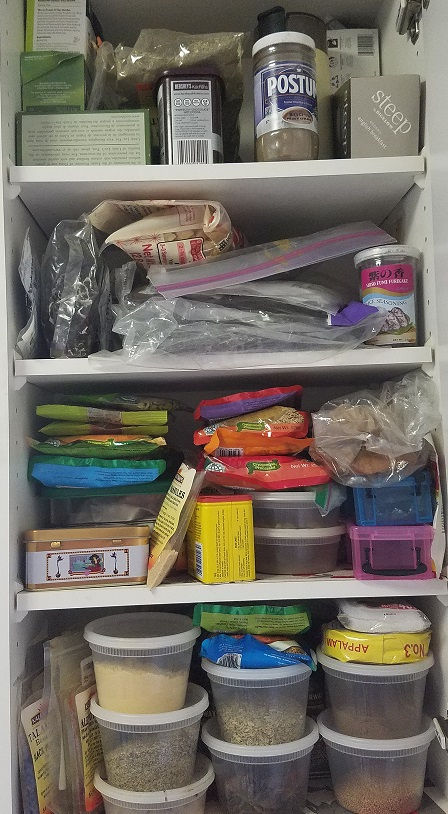Spice, Spice, Baby...A Request For A Spice Starter Kit List
- Sep 15, 2018
- 7 min read
Updated: Jan 19, 2020

L. bringing me back a whole mess of spices from Singapore coincided with an email I recently received about them - what would I recommend as a spice starter kit for a novice cook? I gave this some thought because I am a bit of a spice junkie (and also took this opportunity to review all spices in my pantry and throw out those that were a bit past their prime).
Just to illustrate my obsession:
Here are the spices that I reach for the most often, conveniently portioned out into small containers that magnetically attach to the front of my fridge for easy access (also my freezer list and sustainable fish list):

Below, is a photo of everything else that I use. To be fair, this includes a shelf of teas and cocoa powders, a shelf for bonito flakes, kelps and seaweeds (large and unwieldy products) and the remainder packages of what I already have in small quantities on the fridge, as well as my assortment of spices. And pappadum for emergencies.

Seen like this - in plena, two or three rows deep in the cupboard I must add - I am aware that it may seem excessive, but we all know that my interest in (international) cuisine borders on the pathological...I am lucky: friends and family are very kind and bring me back little envelopes of exotic flavors from their travels. Also, I live within walking distance of Kalustyan's, a store I love so much that I would be content to have my ashes scattered up and down its aisles when I die, and where I spend (a tad) too much money on clear pouches of delightfully smelling powders, twigs and leaves. Seriously, I have to ration my visits there as I am unable to come away empty handed and, despite my intense interest, how many types of salt does a girl really need anyway?
(Having just cleaned and alphabetized my spices, the answer is: 17 (run of the mill table, Maldon flake, Cyprus black lava, Hawaiian lava, bamboo, Himalayan pink, Croatian coarse sea salt, sel de Guerande, coarse gray sea salt, fine sea salt, smoked Welsh sea salt, dulse seaweed sea salt, matcha sea salt, black truffle salt, bay salt, ginger salt and a big bag of cheap rock salt with which to season pasta water). Woops. But I do use them all here and there and having them makes me happy at between $3.99 and $5.00 a pop. So there.
But, back to my recommendations for a potential starter kit. This is obviously a completely subjective list and I am sure that Internet research will yield a bunch of other lists with different recommendations based on how and what the authors cook. Quite frankly, the only spices I truly don't recommend are a few herbaceous ones as described below and onion and garlic powder which I abhor and think always taste burnt and acrid. That being said, I invest in tiny amounts of both every year when I make my (famous) BBQ sauce which tastes strange without them.
IMHO, the true basics:
Salt: Just a plain canister of run of the mill table salt is fine. I use La Baleine brand, Morton's from the supermarket is just fine as well. Depending on budget, you could also invest in a finishing salt, in which case I would advise Maldon salt flakes for your starter kit as well as table salt.
Pepper: I use white pepper more than I use black but I would recommend basic pre-ground black pepper to start and then purchasing white if you cook a lot from my blog (yes please and thank you). If you are very motivated by cooking, go to a spice store, smell all of the various black pepper grains, buy the one that you like the smell of best and invest in a cheap pepper grinder. So far, my particular favorite is Tellicherry pepper but I am fickle and this could change. Tellicherry peppercorns smell and taste more fragrant to me than others that I have tried. I have grains of Paradise on my list of spices to be purchased next, partly because of the name, and partly because what's not to like about pepper with citrus and cardamom notes, as it is often described.
Bay leaf: I use a lot of bay so would be, not exactly lost but perhaps slightly stymied for woodsy flavor palate purposes, without the ability to use this ingredient. You can buy leaves at any supermarket and they add a lot of flavor to stews, Bechamel and other sauces. I love bay leaf so much that, as well as the leaves, I have ground bay to hand, which I use constantly. I would recommend seeing how you feel about the flavor of the leaves before you invest in the ground variety, but personally highly recommend it as a flavor enhancer.
Mustard powder: This is very different than the prepared mustard you keep in your fridge. You can sneak it in sauces, add it to marinades and dressings, it is great on salmon and anything else where you need a little kick of acidic zing. And, of course, you can mix it with a bit of wine and vinegar and use it exactly like the mustard you buy at the supermarket.
Smoked paprika: This is another workhorse spice. It is excellent on roast chicken or on pork and adds a bit of smoky flavor to cream sauces and stews. It also tastes surprisingly good with eggs. Sprinkle some on a chicken that you are about to roast in the oven and you will end up with a beautiful burnished skin on the end result.
Crushed pepper flakes: Nice to have to hand to add a bit of heat to various dishes. If you like heat you can eventually branch out to a whole slew of different fragrant peppers as described below.
Herbes de Provence: Because this contains a mixture of dried herbs, the base of most blends being thyme, rosemary and oregano, you can use this in a lot of different recipes rather than buying a whole bunch of spices at once for your starter kit.
Some suggestions for your next round of acquisitions:
Chili powder: This isn't a necessary spice in the starter kit scheme of things but I like it, not just for chili but also for many soups and bean-centric dishes. Black beans, tomato and chili powder as the base for a soup are magical together.
Cumin/Coriander/Cardamom: I use this trio of spices a lot and highly recommend adding them to any spice repertoire. They smell delicious, add warmth and flavor and are surprisingly versatile.
Cinnamon/Nutmeg/Cloves: These are good for baking. Also, cinnamon enhances tomatoes, nutmeg enhances spinach and cream sauces, cloves are great with ham and pork. Once you have acquired these, you will find lots of uses for them.
Sage/Thyme/Oregano/Dill/Rosemary: Any or all of these are good to have on hand as you cook more and grow more confident in your seasoning abilities. I would recommend buying these at a spice store in the smallest possible quantity so that they actually taste of something when you get around to using them. I should also add that in IMHO it is a waste of money to purchase dried basil, tarragon, mint or parsley as they never seem to have any taste whatsoever no matter how fresh they are at time of purchase. With those herbs, fresh is always seems to be best. I mostly buy fresh herbs when at all possible anyway, with sage being the one herb that I actually think flavors dishes best when dried.
As your cooking skills and your spice obsession progress:
Curry Powder/Saffron/Turmeric/Garam Masala: As you cook more and start cooking international food at home, these spices will come in handy. Also, saffron is great with rice dishes and stews, turmeric adds color and a faint bitterness to various dishes - one of my favorites being grain pilaf - and curry powder can save a bland dish in a pinch or make a boring vegetable a bit more interesting to eat.
Star Anise/Szechuan Peppercorns/Chinese Five Spice: Great for Chinese food based dishes and for adding general pep and zing to many items. Szechuan Chili Oil should be a staple in any fridge.
Za'atar/Sumac: More delicious spices for any of your Middle Eastern flavor inspired recipes. Sumac adds a nice piquancy to dishes and I use Za'atar on flat breads or add it to stews.
Espelette Pepper/Shichimi Togarashi/Aleppo pepper: If you like a bit of warmth and heat, all of these are good options to own and have very different flavor palates. And if you have the collector's gene, you can find a whole bunch of other stellar items in this category,
Old Bay: Old Bay was made in Baltimore and is forever associated with seafood; I particularly like it with shrimp. That being said, it is delicious sprinkled on fries and steamed veggies and eggs. I reach for the bright yellow can often when I am stumped for ideas and need a bit of zing in a dish.
Fennel Seed/Caraway: Both add woodsy notes to any dish that they are used to flavor. I like fennel seed with both pork and carrot dishes and caraway with cabbage, and pork roast, rubbed with garlic oil and dusted with smoked paprika and caraway is absolutely delicious.
You know you are a goner when you purchase items such as:
Lavender/Orange peel powder: Excellent for baking but also for cocktails and adding interesting undertones to various dishes. Lavender combined with Herbes de Provence make a good rub for leg of lamb and an interesting addition to home made lemonade. Orange peel powder is great on broccoli, roast duck and most Chinese inspired dishes. You can also make your own pretty easily.
Myriad peppers and salts as already described above.
Spices that you have no idea how to use or have never heard of, simply because they smell good or look intriguing. You'll do the research, you will use them, but there will be no turning back from your spice habit then...

Comments